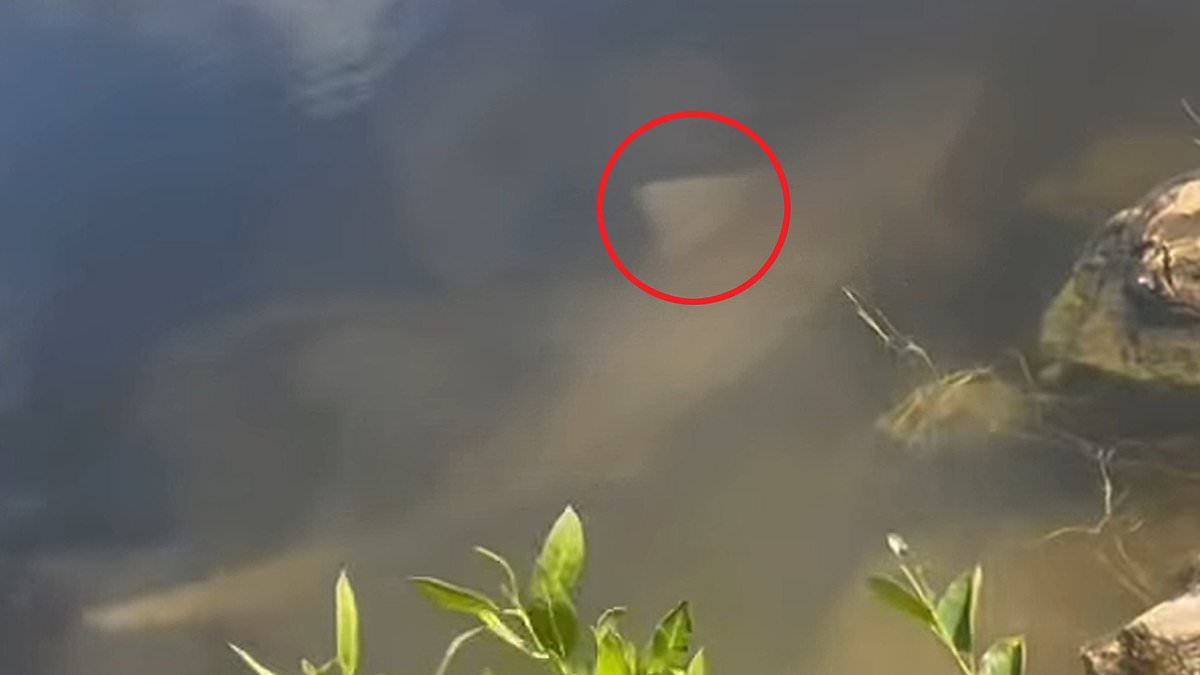A baby bull shark has been found swimming in a Florida lake miles away from the ocean after Hurricane Helene slammed into the Gulf coast.
The ocean predator has seemingly found a new home at Lakes Park in Fort Meyers, almost 10 miles from Fort Myers Beach, after the Category 4 storm ripped through the Southeastern states leaving a 500-mile path of pure destruction.
Experts think that Helene had a role to play in why the baby bull may have ended up in the freshwater lake, WBBH reported.
Susannah Cogburn, graduate student of Environmental Science at Florida Gulf Coast University, studies the creatures that live under the sea.
With experience in the fields of chemical oceanography, biological oceanography, marine physiology and scientific diving, she believes the most plausible explanation to be geography.
‘It definitely could be related. Looking at the geography of where Lakes Park is, the most probably thing that happened is it came up through Hendry Creek,’ Cogburn told WBBH.
Hendry Creek ends at Lakes Park which connects to Estero Bay and then eventually – leads right into the Gulf.
‘Especially with all the flood water, it could have really, you know, pushed the shark there, and then when the water receded it just stayed in Lakes Park.’
Hurricane Helene brought back harsh memories for Florida residents. It made landfall just two days from the second anniversary of Hurricane Ian, Fort Meyers Beach Talk reported.
Strong wind gusts reaching 70mph and intense flooding hit the state, including Fort Meyers, which saw three to five feet of water taking over homes.
Many residents were nearing completion of home repairs after the catastrophic Category 4 hurricane hit in 2022, the most costly storm in Florida’s history.
These same residents have been left with a home in need of repair yet again.
Bull sharks usually inhabit the ocean, typically tropical to subtropical coastal waters worldwide.
Despite the drastic change in location, these bulls are one of a few shark species that have a very special quality about them, even earning the nickname ‘river sharks’, IFAW reported.
They’re known to swim long distances into rivers, even being found 2,400 miles up the Amazon River.
‘Bull sharks are really unique,’ Cogburn added. ‘They have this adaptation that allows them to live in fresh and saltwater environments.’
The freshwater lake may put the shark under a bit of stress, but as long as he has enough food he will be okay.
‘As the only shark in the lake, it seems like they should have an ample amount of food to feed on,’ Cogburn said.
Now, the fish, alligators and turtles that are commonly seen in and around Lakes Park have a new roommate.
But the baby bull could very well be a nightmare of a roomie.
The species is thought to be one of the most dangerous shark species in the world.
Bull sharks are opportunistic feeders, sitting at the top of the food chain.
They consume a slew of different prey in their diet, typically head-butting their meal before going in for the kill.
Generally, they feed on rays, birds, dolphins and even other sharks.
And of course, they eat fish and sea turtles.
As of now, there is no word on if Florida Fish and Wildlife plans to move the bull out of the lake for a relocation.
While the poor turtles may be fending for their lives in the Florida lake, humans are not a part of the shark’s diet, despite them being known to be aggressive towards humans.
They are very territorial creatures, especially during breeding season. But shark attacks are very rare. There are fewer than 20 deaths caused by shark attacks reported each year, IFAW reported.
This chance to see a shark in a lake could be a once-in-a-lifetime opportunity.
Especially a lake-living bull shark, whose population has been decreasing throughout the years.
In 2020, the IUCN Red List classified bulls as a vulnerable species.
